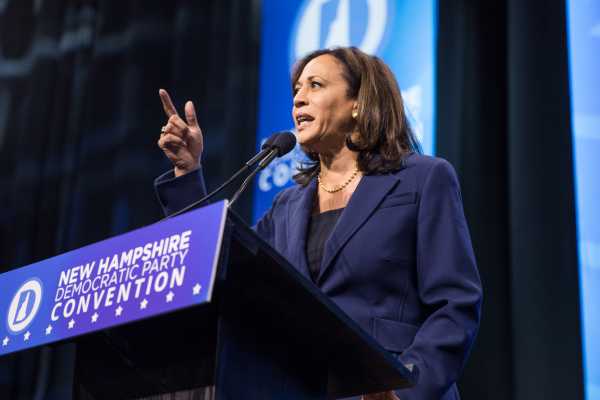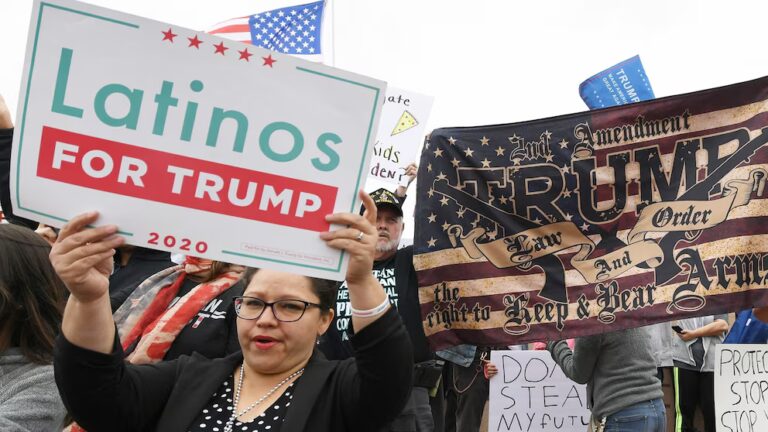
Part of
Vox’s guide to where 2020 Democrats stand on policy
Democratic presidential candidate Kamala Harris on Monday released a criminal justice reform plan that would attempt to undo mass incarceration and the war on drugs — and can also be read as a rebuke of critics of Harris’s record as San Francisco’s district attorney and California’s attorney general.
Harris’s plan includes a litany of ambitious goals: legalize marijuana, abolish mandatory minimum sentences, end the death penalty and solitary confinement, stop private prisons, get rid of cash bail, and leverage the president’s clemency powers to reduce the number of people in federal prison.
It takes aim at “decades of failed policies” that “created an unjust, unequal, and vastly expansive system that disproportionately harms communities of color and criminalizes individuals just because they are poor,” Harris wrote.
With her plan, Harris joins other candidates who have released criminal justice reform proposals, including Joe Biden, Elizabeth Warren, Bernie Sanders, Cory Booker, and Amy Klobuchar. Harris’s ideas generally line up with what the other candidates have put forward in an attempt to end mass incarceration.
But in Harris’s case (as was true for Biden and Klobuchar), the plan is also a response to critics who argue that as a local prosecutor and state attorney general she was part of the same system they see as in need of reform.
Harris’s record on criminal justice issues is truly mixed. As a US senator for California, she has consistently been a champion for reform — up to supporting the First Step Act, which President Donald Trump signed into law, and introducing legislation, such as her proposal for nationwide bail reform, to change the system.
As district attorney and later attorney general, she pushed for programs that helped people find jobs instead of putting them in prison, but also fought to keep people in prison even after they were proved innocent. She refused to pursue the death penalty against a man who killed a police officer, but also defended California’s death penalty system in court. She implemented training programs to address police officers’ racial biases, but also resisted calls to get her office to investigate certain police shootings.
Harris’s campaign has gone to great lengths to paint her as a “progressive prosecutor” and emphasize the more progressive parts of her record. But the other side of her tenure in the criminal justice system has also drawn high-profile criticism, including at the most recent Democratic debate.
With the rise of Black Lives Matter and criminal justice reform in general getting more and more attention and support from Democrats, how Harris comes out on this question may be crucial to her chances of capturing the White House. So just as much as her new plan is a policy document, it’s also a political one — and could help decide whether she becomes the Democratic nominee for president.
What Harris’s plan would do
Harris’s plan is fairly comprehensive, targeting aspects of the criminal justice system from the federal level all the way down to the local level, and combining many of the mainstays in Democratic criminal justice reform proposals.
Harris would legalize marijuana and use the money raised from marijuana tax revenue to help people and communities hurt by the war on drugs. She would seek to end mandatory minimums at the federal level and financially encourage states to do the same. She would use her clemency powers as president to set up a sentencing review unit for people who have been sentenced to 20 years or longer in prison to see if their sentences should be shortened after 10 years served. She would boost funding for public defenders and try to hold prosecutors more accountable.
Harris would encourage the end of juvenile incarceration in favor of more supportive social services. She would also look to boost rehabilitation and reintegration programs for people convicted of crimes more generally.
Some of her proposals would target police in particular. She would establish a national standard for use of deadly force that would allow it “only when ‘necessary’ and when no reasonable alternatives are available.” She would create a National Police Systems Review Board to gather policing data and issue recommendations for reform and safety standards. She would encourage the US Department of Justice to investigate police shootings, as well as broader investigations of troubled police departments. And she would push states and municipalities, with financial incentives, to change police training, among other changes.
Harris would also establish a “National Criminal Justice Commission” — the first of its kind since the Katzenbach Commission set up by President Lyndon Johnson in the 1960s — that would aim to study the criminal justice system, make evidence-based recommendations for reform (particularly for people held in prison for violent offenses), and develop better ways to track outcomes for the system.
And the plan would try to help victims of crime as well, seeking to clear the backlog of rape kits and go after “corporate bad actors” such as big banks and for-profit colleges.
Harris’s proposal is particularly careful to emphasize that much of the work to reform the criminal justice system must happen at the local and state levels, with several parts of the plan emphasizing financial incentives to encourage lower-level reform. This is really key to reforming the system; for example, roughly 88 percent of people in prison are held at the state level, while about 12 percent are at the federal level.
Her plan also acknowledges that most of the people in prison at the state level are in for violent offenses, so cutting incarceration will require doing something about how many people are in prison even for violent crimes — which is why her National Criminal Justice Commission would study this issue in particular.
The question is how likely any of this is to happen. For one, getting real reform across the US will require cities and states to come on board, since that’s where most incarceration and policing happens. But state governments, for example, have refused federal incentives for criminal justice reform in the past, typically adopting the policies only if they had prior interest. The same could happen under a Harris administration, especially in Republican-controlled cities or states.
Another question is if these ideas could really get congressional approval. While Harris could do some of them alone, much of her plan would require congressional action. Given that Congress took years of negotiations to pass a fairly mild criminal justice reform bill in the First Step Act, it’s unlikely the House and Senate will do anything as sweeping as what Harris is proposing anytime soon.
If nothing else, though, the plan tries to signal to criminal justice reformers that Harris really is on their side.
Harris wants to prove she’s a reformer
For Harris, her criminal justice reform plan may be key to countering some of her loudest and most persistent critics — who have long argued that she was not as progressive as she claims she was during her tenure as San Francisco district attorney and California attorney general.
Harris did take on some progressive stances in both these roles. She refused to seek the death penalty against a man convicted of shooting a police officer, even under pressure from members of her own party. She created a “Back on Track” program that allowed first-time drug offenders, including drug dealers, to get a high school diploma and a job instead of prison time. She introduced and expanded what her office described as “first-of-its-kind training” to address racial bias as well as procedural justice among law enforcement.
But she also took some “tough on crime” positions. Harris’s office fought to release fewer prisoners, even after the US Supreme Court found that overcrowding in California prisons was so bad that it amounted to unconstitutional cruel and unusual punishment. She argued against the release of innocent people in prison, such as Daniel Larsen, who was ultimately helped by the Innocence Project. And while she long publicly opposed the death penalty, she defended it in court.
Even after Harris has tried to bolster her reformer bona fides as US senator, her past has continued to haunt her. Lara Bazelon wrote in the New York Times that, in her past roles, “Ms. Harris did not barter or trade to get the support of more conservative law-and-order types; she gave it all away.”
The concern here isn’t merely figuring out whether Harris is an honest person. A constant worry in criminal justice work is what would happen if, say, the crime rate started to rise once again. In such a scenario, there would be considerably more pressure on lawmakers — and it’d at least be easier for them — to go back to “tough on crime” rhetoric, framing more aggressive policing and higher incarceration rates in a favorable way.
Given that the central progressive claim is that these policies are racist and, based on the research, ineffective for fighting crime in the first place, any potential for backsliding in this area once it becomes politically convenient is very alarming.
This happened before. From the 1960s through the ’90s, crime and drug use were skyrocketing in the US. Americans were much more likely, especially in the early ’90s, to say that crime was the most important problem facing the country at the time. That drove lawmakers, both Democrats and Republicans, to try to find solutions that they could sell to the public — and they by and large landed on a more punitive criminal justice system.
But any link to those “tough on crime” policies now could hurt Harris politically. According to a 2016 Vox/Morning Consult survey, around two-thirds of Democrats support removing mandatory minimum sentences for nonviolent drug offenders, reducing sentences for drug offenses in general, sentencing more people to probation and community service instead of prison, and adopting a national law decriminalizing marijuana. Other polls have found even higher support for criminal justice reforms among Democrats.
In response to the criticisms, Harris said during the first day of her presidential campaign that she took “responsibility” for some of the problems: “The bottom line is the buck stops with me, and I take full responsibility for what my office did.”
And now Harris has released a sweeping criminal justice reform plan.
The question, for Harris’s political future, is if that will be enough.
Sourse: vox.com






